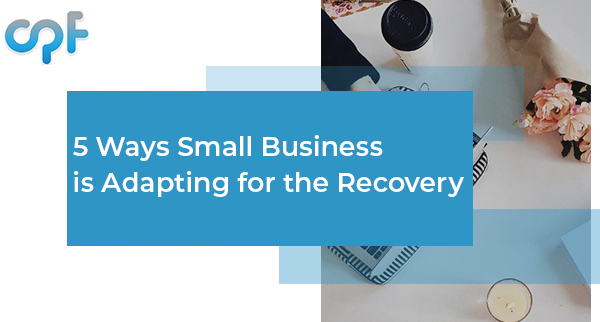The health of Australia’s small businesses is integral to the wellbeing of the broader economy. Small businesses makeup almost 98% of all businesses in Australia and employ over 2.2 million people. While the effects of the COVID-19 pandemic remain, there is light at the end of the tunnel. Apart from Victoria, Australian businesses are well and truly in the process of bouncing back to their previous levels, and beyond.
Throughout the pandemic, small businesses displayed an impressive level of resilience to external factors, shifting their operations to weather the storm. Smaller companies have an advantage over their larger counterparts when it comes to agility. It’s no secret that when times get tough, those that most successfully adapt and evolve prosper the most. As the economy continues to recover, businesses must identify and take advantage of lasting structural changes as well as carefully manage the process of returning to the ‘new normal’. Here are five ways small business is successfully adapting for the recovery:
Taking advantage of opportunities
It’s clear that while many industries experienced a substantial drop in demand for their products and services, such as tourism and events, certain pockets were well placed to meet booming demand elsewhere. The ‘lucky’ companies that were already selling hot products, such as sanitiser, face-masks or exercise equipment have been in the right spot to scale and take advantage of the bitter-sweet opportunity presented to them. Importers, wholesalers and retailers are well placed to shift their product offering towards products that are in increasing demand.
Regardless of your industry, customer behaviours have rapidly accelerated towards digital and online retail. Developing an effective e-commerce strategy has become essential for the modern small business. Even if your product or service doesn’t lend itself well to a digital environment, ask yourself how your brand can leverage social media and the internet to better reach and connect with your existing customers, as well as appeal to new ones.
Focussing on the customer
With consumer preferences rapidly changing and the low-cost of switching brands when commerce moves digital, it’s more important than ever to nail the customer experience. Before aggressively pursuing new clientele, make sure you’re looking after your existing base. It costs far less to convince a customer to return than it does to acquire and convert a completely new one.
“It’s better to invest in keeping your customers happy than lose them for good.”
Ask your fans what they want to see from your business. Nothing beats the words from your customer’s mouth. Offer loyalty rewards and perks to keep your base loyal. For example, a physical retail business forced to close their doors could push their online experience by offering free shipping and seamless return policies. While this may push costs up in the short run, it’s better to keep your customers happy than lose them for good.
Embracing digital transformation
Remote working has been a hot topic for the last six months. Businesses that embraced flexible working early had a significant advantage in the early stages of the pandemic as they faced less disruption in their operations. Digital transformation will continue to be an accelerating trend impacting all businesses at an increasing rate moving forward. How else can your organisation embrace new technology?
“embracing digital transformation is key to staying competitive and successfully adapting to customer expectations.”
Invest in software to help your teams collaborate effectively while working from home. Change your processes to make communication with your customers increasingly frictionless. Install a messenger chatbot or live chat feature on your website. Instead of physical contracts, have your customers provide their documents and sign contracts digitally. Whatever this looks like for your business, embracing digital transformation is key to staying competitive and successfully adapting to customer expectations.
Updating their marketing strategy
It’s not enough to change your offer, business model and way of working if your customers don’t know about it. The way you reach your customers must change as well. While you might not need a complete marketing overhaul, the best small businesses have been nimble and clever in how they approach their marketing strategy. Manage costs by shifting to well-placed online ads, competitions and free content (such as blogs and information downloads) to deliver value and engage your audience. Create specific offers to appeal to customer behaviours, such as a free delivery night for your cafe or restaurant.
Securing appropriate finance
Small businesses are often reliant on external capital to support their growth and operations. COVID-19 has exposed many companies that did not have an effective financing strategy in place. You must ensure your funding is appropriate for your unique situation, providing flexibility and support when you need it. As risks are currently elevated when it comes to taking on new debt, it pays more than ever to explore alternative financing options from a traditional bank loan.
A small business loan, backed by the SME Loan Guarantee Scheme may provide your business with the working capital and repayment certainty you need to get through the next few months. Other options, such as debtor finance, provide access to working capital based on your accounts receivable ledger. Regardless of your financing situation, consulting an expert is always a great first move. Business finance brokers use their experience and industry knowledge and lender relationships to source the best deals for your small business.
Capital Plus Finance is an experienced business finance broker that has your best interests at heart. The team at Capital Plus Finance will do everything we can to help you secure a suitable finance solution for your small business. Please give us a call anytime to find out more or to have an obligation-free chat about your business’s funding situation.





